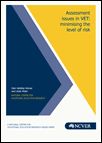Description
This report explores some of the key issues associated with the assessment in VET and reflects on some possible solutions. The authors provide examples from three industry areas where concerns have been raised about the quality of provision and assessment and some conclusions are drawn on the issues raised; specifically Childcare and Aged Care Services and the Certificate IV in Training and Assessment (TAE).
Summary
About the research
This report explores some of the key issues associated with assessment in vocational education and training (VET) and reflects on some possible solutions. The authors provide examples from three industry areas where concerns have been raised about the quality of provision and assessment, with some conclusions drawn on the issues raised, specifically relating to childcare and aged care services and the Certificate IV in Training and Assessment (TAE).
Key messages
- Large groups of existing workers in the childcare and aged care services industries have been required to attain or upgrade qualifications to keep abreast of regulatory changes. This has led to some apprehension among training providers and industry about the rigour and consistency of assessments, including the recognition of prior learning (RPL).
- Courses of short duration, coupled with insufficient training, are felt to increase the risk of poor skills acquisition and rigour in assessment, including for entry-level teachers and trainers.
- Inadequate mechanisms for selecting students with the appropriate attributes and motivations for working in the caring occupations (including aged care and childcare) are felt to reduce the quality of training and assessment.
- A lack of systemic validation and moderation processes within and between providers and training systems is reducing the level of confidence in the comparability and accuracy of assessments.
- The tendency on the part of assessors to develop and implement their own assessment tools and materials, as well as system imperatives for assessors to customise assessments to local contexts, may be factors contributing to a reduction in the comparability and accuracy of assessments. The regular use of independent assessors can help to minimise this risk.
- The Certificate IV in Training and Assessment may require more explicit content in relation to assessment if it is to provide teachers and trainers with the levels of underpinning knowledge and practice sufficient for undertaking quality assessments.
- The regular involvement of employers in assessments, including off-the-job assessments, needs to be encouraged.
Tom Karmel
Managing Director, NCVER
